How Many Backlinks Do I Need To Rank?
Oct 03, 2023
Written by Ethan Zacks

Ethan, a dedicated Serior Sales Rep at Vazoola, specializes in link building strategy, anchor text selection, and backlink quality. With a background in communications from the University of Connecticut, he excels in building meaningful client relationships. Outside of work, Ethan enjoys gaming, movies, and exploring new restaurants with friends and family in his home town Trumbull, Connecticut.
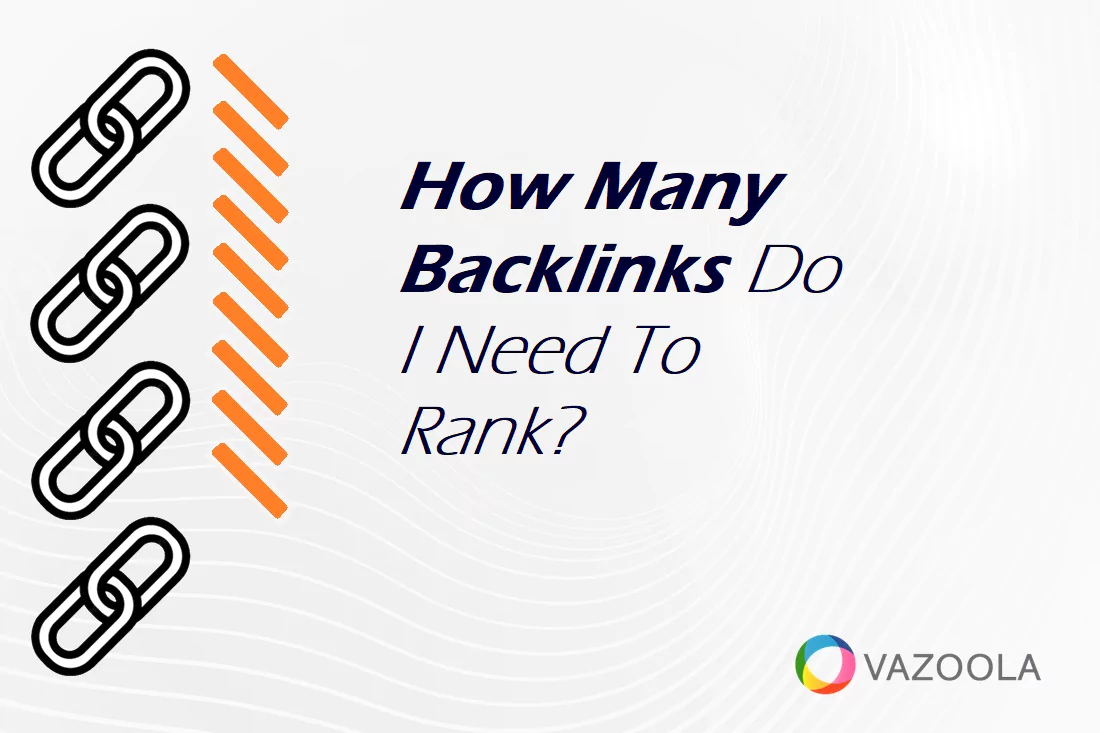
Determining the number of backlinks needed for a website to rank effectively in search engine results is far from an exact science.
Do you need more links in general, or should you focus on fewer backlinks from more authoritative domains?
The answer to this pivotal question fluctuates, depending on a myriad of ranking factors unique to each website.
To arrive at a more accurate estimate, you have to synthesize data from a variety of sources.
Here at Vazoola, our link-building experts consistently conduct research to help our clients find solutions for their unique websites. We focus on several key questions:
-
Is your page optimized for backlinks?
-
How fierce is the SEO competition for your target keyword?
-
How many backlinks and referring domains do top-ranking pages have?
-
Does your content meet high-quality and relevance standards?
-
How do backlink quantity and quality correlate?
Are the answers eluding you? Stick with us as we guide you toward the key.
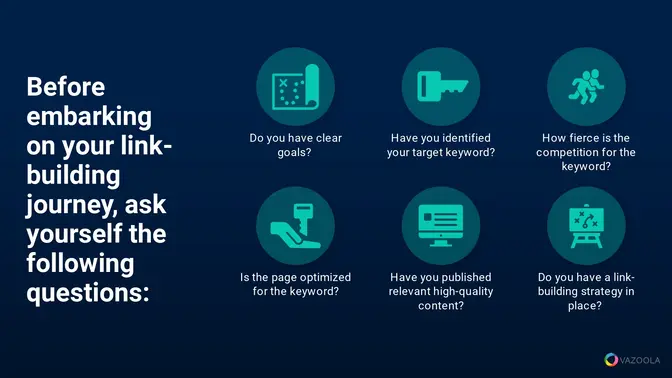
Key Takeaways:
-
There's no one-size-fits-all answer for the number of backlinks needed to rank; it depends on the competitiveness of your niche, the authority of your website, the quality of your content, and the authoritativeness of your backlinks.
-
In general, you need more backlinks for competitive keywords and fewer backlinks for less competitive keywords
-
The number of backlinks your competitors have will influence how many backlinks you will need.
-
Quality outweighs quantity in backlinks; one highly authoritative backlinks can outweigh many low quality links.
-
Be cautious with the rate of backlink acquisition; too many too quickly can be risky, and the impact varies over time.
Table of Contents
The Significance of Backlinks in SEO
Backlinks are one of the cornerstones of search engine optimization. Inbound links act as endorsements from other websites, signaling to search engines that you've published valuable content that is worthy of higher ranking in search engine results pages.
Google places significant emphasis on the quality of links pointing to a website. According to a study by Backlinko, backlinks remain one of the top ranking factors in Google's algorithm.
Google employs complex algorithms to evaluate the quality and relevance of backlinks.
Other factors such as the authority of the linking website, the relevance of the linked content, and the anchor text used on other sites all play a role in this evaluation. Google's Webmaster Guidelines provide further insights into what the search engine considers when evaluating links.
Quantity Versus Quality: The Backlink Consensus
So, you probably already know about how important backlinks are to your SEO strategy and Google rank. Now it's time to investigate what types of backlinks offer greater value, optimizing your efforts.
The debate between the quantity and quality of inbound links has long been a subject of discussion among SEO professionals.
Backlinks: Quality over quantity is the key. A few high-quality, relevant backlinks from authoritative sites can do wonders for rankings compared to a large number of low-quality links. Avoid black-hat techniques like link buying, which can lead to penalties.
— Pontus Vippelius (@pontusvippelius) September 17, 2023
Generally speaking, our experience at Vazoola has shown that while having a large quantity of backlinks can be beneficial, the quality of those links is equally, if not more, important.
A study by Moz supports this claim, indicating that if you build links from authoritative sites, you more substantially impact your website's rankings than if you acquire a more low-quality links.
Stay tuned as we explore each of these critical questions in greater detail to assist you in determining the precise number of incoming links needed for effective ranking.
How Many Links Does it Take to Rank High in Search Results?
So, just how many links are good for ranking high in Google search results?
According to SEO Chatter founder Stephen Hockman, website should have 40 to 50 backlinks to its homepage and between 0 and 100 backlinks to each individual web page to be competitive for SEO.
But that's just an estimate. Hockman even offers additional advice, elaborating on the variables.
"You need 0 to 25 backlinks to rank for low competition keywords and 50 to 100 backlinks for high competition keywords on average," Hockman said. "However, the exact number of backlinks you need to rank a web page depends on your website’s domain authority and the PageRank of the incoming backlinks."
The truth is, there is no exact answer the question. A variety of factors come in to play when determining how many backlinks are good for ranking, including the quality of your web page, those linking to you and even the rate at which you acquire more backlinks.
Before diving into the intricacies of backlink acquisition, however, you first must ask, "Am I ready for backlinks?"
Determining the number of links required to rank high in search results is a complex equation, influenced by a variety of factors like keyword difficulty, competition, and the current state of your website's SEO.
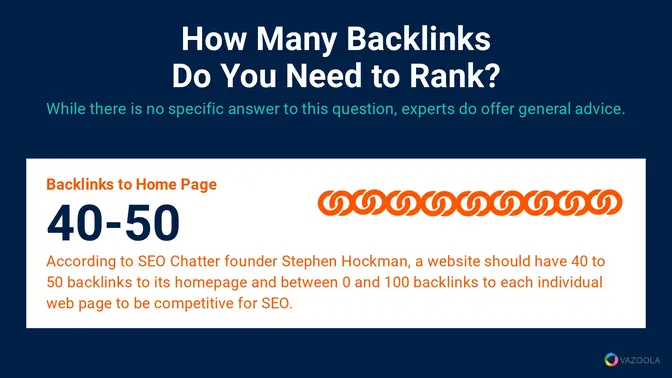
Before embarking on a backlink acquisition journey, it's imperative to assess your website's readiness for such an endeavor.
-
Have you identified the primary keyword for your webpage?
-
Is the page optimized for this keyword?
If the answer to either of these questions is no, you're not yet in a position to focus on backlinks.
A well-optimized page is the foundation upon which a successful backlink strategy is built. Without this, even the best backlinking efforts may prove futile.
While we have a separate blog post that addresses the question of "When should I start link building?" for the purposes of this article, we'll assume you're ready to proceed.
It's worth noting that industry experts often recommend building backlinks at a gradual rate.
The top-ranking pages on Google have, on average, links from hundreds of unique websites. However, accumulating all the links over time, rather than in a short burst, appears more natural to search engines and is less likely to incur penalties.
Therefore, the question isn't just how many backlinks you need, but also how quickly you should acquire them and from what types of websites. A nuanced understanding of the types of ranking factor can significantly impact your website's ranking potential.
Components That Influence Your Link Requirements
In order to determine how many links to acquire, it's pivotal to consider various factors including keyword you are trying to rank for, the quality of your content, the strength of your competitors, and balance of backlink quantity and quality you'll need.
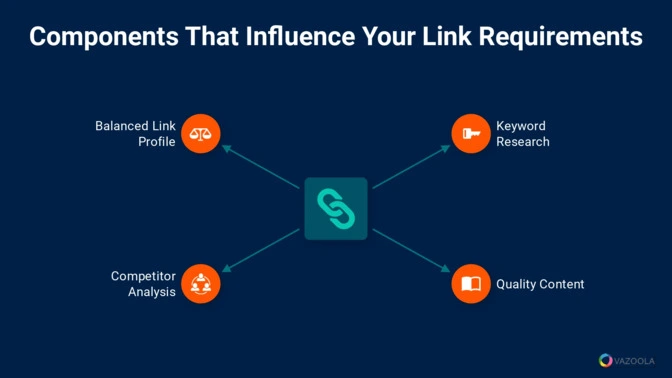
Understanding these elements will equip you to craft a more effective and targeted backlink strategy.
Conduct Thorough Keyword Research
Is your page optimized for the right keyword? It's time to find out.
After all, keyword research is not merely a preliminary step; it's a cornerstone in shaping your SEO strategy that shines a necessary light on your optimization efforts.
Our recommendation: A well-executed keyword research process can significantly influence the success of your backlinking efforts.
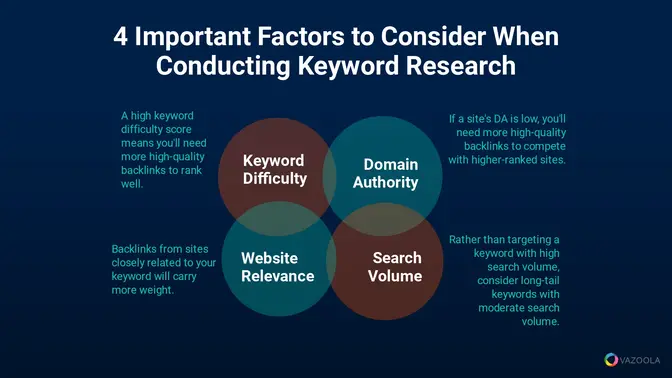
When conducting keyword research, several critical factors warrant consideration, particularly the following:
-
Keyword Difficulty: The metric gauges the competitiveness of a keyword. A high keyword difficulty score suggests that you'll need a substantial number of high-quality backlinks to rank well. Conversely, a lower score indicates less competition, meaning fewer backlinks may suffice.
-
Domain Authority: A website's domain authority matters when choosing a target keyword. If the domain authority is low, you'll likely need more backlinks to compete with more established websites.
-
Website Relevance: Ensuring that your website is closely relevant to the keyword you're targeting is crucial. Search engines prioritize relevance, so links from sites closely related to your keyword will carry more weight.
-
Search Volume: Targeting a keyword with high search volume can be tempting, but it often comes with increased competition. We recommend also considering long-tail keywords with moderate search volume, as these can be easier to rank for and still drive significant traffic.
-
Keyword Intent: For each specific keyword you consider, be sure to take note of the intent that the user has when searching. Also do a quick Google search for each potential keyword and look at the types of pages Google returns first. Are there pages selling things? Reviewing items? Educating users? Your page should match the intent of the keyword and type of pages preferred by Google.
Tools like Ahrefs' Keyword Explorer can be invaluable in effective keyword research. They provide an estimate of the number of backlinks needed to rank on the first page.
For example, is the inbound link from a blog post, forum, or news site? The information can help you tailor your outreach and strategies for creating content more effectively.
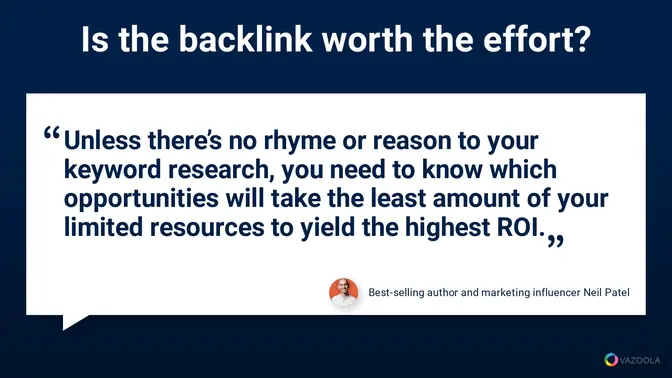
“Unless there’s no rhyme or reason to your keyword research, you need to know which opportunities will take the least amount of your limited resources to yield the highest ROI,” explained digital marketing influencer and best-selling author Neil Patel.
By conducting comprehensive keyword research, you set the stage for a more targeted and effective backlink acquisition strategy. This focused approach, based on our extensive experience at Vazoola, will better equip you to rank for your keyword with less backlinks.
Pro Tip:
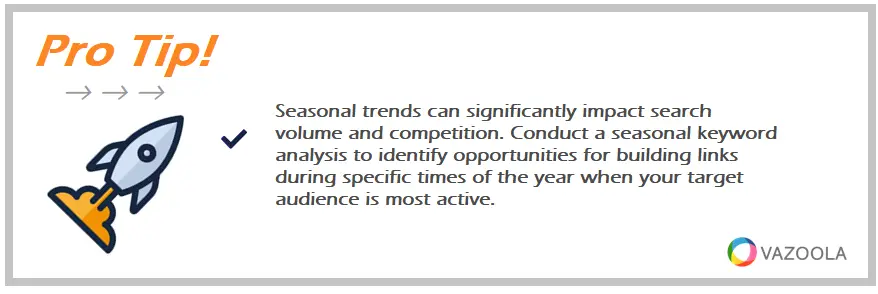
Seasonal trends can significantly impact search volume and competition. Conduct a seasonal keyword analysis to identify opportunities for building links during specific times of the year when your target audience is most active.
Assess the Quality of Your Content
Content quality is a cornerstone in your SEO and backlinking strategy. Google's algorithms prioritize content that is high-quality and aligns with the search intent of your target keyword.
At Vazoola, we emphasize that excellent content can amplify your link-building effectiveness.
If your content lacks quality, even high-quality backlinks may not yield optimal ranking results. Similarly, a mismatch between your content and the keyword intent can make ranking more challenging.
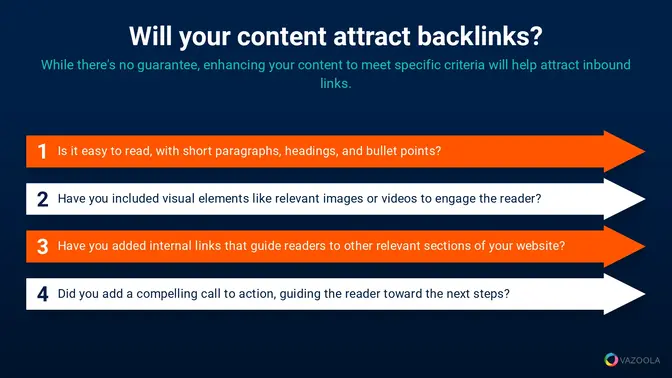
Tools like Surfer SEO are invaluable for evaluating on-page SEO factors like content depth and keyword usage.

Ahrefs' content gap tool can identify areas where your competitors are outperforming you, offering actionable insights for improvement.

To further enhance your content, consider the following points:
-
User Experience: Make your content easy to read by using headers, bullet points, and short paragraphs.
-
Visual Elements: Add relevant images or videos to complement the text and engage the reader.
-
Internal Linking: Use internal links to guide the reader to other relevant sections of your website, improving both user experience and SEO.
-
Calls to Action: Include a compelling call to action, guiding the reader on the next steps, whether it's reading another article or signing up for a newsletter.
By diligently assessing and refining your content, you'll be better positioned in your quest to answer the question: "How many backlinks do I need to rank?"
Analyze Your Competitors to Find Link Gaps
Armed with the right keyword information, the next step involves identifying your competitors—those websites that rank well for your target keyword. This is a critical step in determining how many backlinks it takes to rank well.
First its important to specify what "competitor" means in this context. When trying to determine your backlink requirements, the "competitors" to focus on will be the pages ranking on the first page for the keyword you are trying to rank for. Comparing your page with these can offer valuable insights.
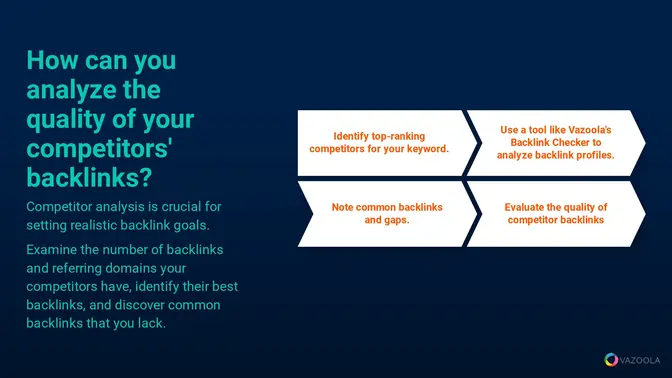
Since competitor backlinks are crucial for setting realistic backlink goals, you'll want to examine the number of backlinks and referring domains your they have, identify their best backlinks, and discover common links that you lack.
How can you analyze the quality of your competitors' backlinks? Start by taking the following steps:
-
Identify top-ranking competitors for your keyword. Focus more closely on pages that are similar to yours.
-
Use a tool like Vazoola's Backlink Checker to analyze each website's backlink profile.
-
Note common backlinks and gaps.
-
Evaluate the quality of competitor backlinks.
For a more comprehensive guide, read our backlink profile blog post.
Identifying the basic count and composition of competitor page backlink profiles will be key data points for your backlink requirements equation.
Pro Tips:
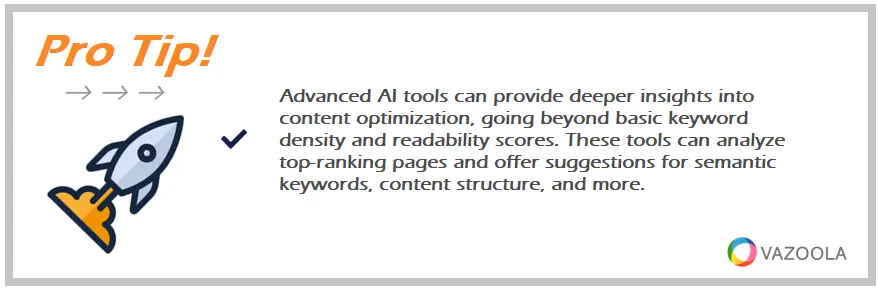
Advanced AI tools can provide deeper insights into content optimization, going beyond basic keyword density and readability scores. These tools can analyze top-ranking pages and offer suggestions for semantic keywords, content structure, and more.
Balance Link Quantity with High-Quality Backlinks
Are less backlinks always bad? Are more backlinks always better?
While accumulating a large number of backlinks may seem like a viable strategy, we at Vazoola emphasize the importance of quality over quantity.
While there is no direct calculation for how much value a backlink will pass, when you build high-quality backlinks, they pass more link equity and contribute more effectively to your ranking efforts. For further insights, read our high-quality backlinks post.
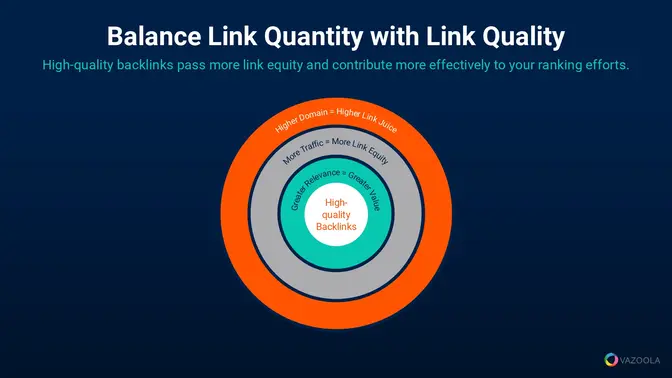
Domain Authority of Backlink
Domain Authority is a crucial metric in evaluating backlink quality. Developed by Moz, the score ranges from 0 to 100 and provides an estimate of a website's ability to rank in search engine results.
A backlink from a website with a high DA score, such as 50, carries significantly more weight and link equity than two inbound links from websites with lower DA scores, like 25.
1. Focus on Link Building:
— Robb Fahrion || Flying V Group (@RobbFahrion) July 9, 2023
Websites with a higher number of backlinks tend to have higher domain authority. Conduct a thorough backlink audit using tools like @semrush or @ahrefs to assess your current profile.
Achieving a high DA score is a long-term commitment that involves not just link building but also producing high-quality, relevant content and ensuring a good user experience on your site.
Given that domain authority operates on a logarithmic scale, elevating your score from 60 to 70 proves more challenging than moving from 20 to 30. For strategies on enhancing your domain authority, consult our guide.
Traffic of Backlink
Domain authority is far from the only factor impacting the quality of links.
Websites that consistently attract high levels of organic traffic generally are viewed as authoritative and trustworthy by search engines like Google. This trust translates into greater link equity when such a site links back to yours.
In our experience at Vazoola, backlinks from high-traffic websites often yield more significant improvements in search engine rankings compared to those from lesser-known sites.
The rationale is simple: A website that garners substantial organic traffic is likely producing high-quality, relevant content that search engines want to promote.
Therefore, a backlink from such a site serves as a strong endorsement, amplifying the authority and credibility of your own website in the eyes of search algorithms.
Execute caution when seeking backlinks, then, since the vast majority of sites on the web don't receive enough traffic to provide a boost to your backlink profile, as demonstrated by the Ahrefs study illustrated below:
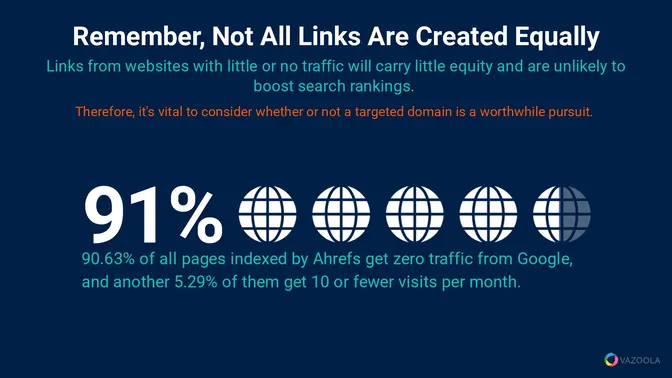
Relevance of Backlink
Relevance holds significant weight in the effectiveness of backlink strategies.
A backlink becomes exponentially more valuable when originating from a site that is closely related to your specific niche or industry. This relevance extends to the content surrounding the backlink and the anchor text used.
Search engines like Google find it easier to crawl and understand the context of your backlink when it is embedded within relevant content. This contextual alignment enhances the link authority passed to your site, thereby boosting your chances of ranking higher in search results.
To ensure you're building relevant backlinks, consider the following tips:
-
Audit: Conduct a thorough audit of potential linking sites to ensure they align closely with your industry or subject matter.
-
Tools: Use tools like Ahrefs or Moz to analyze the content and backlink profile of these sites, ensuring they are reputable and have a history of linking to quality, relevant content.
-
Contact: Craft personalized outreach emails that explain the mutual benefits of a backlink exchange or guest post opportunity.
-
Anchor Text: Opt for anchor text that is not only keyword-rich but also contextually fits within the content that will host the backlink.
By selecting relevant sites for backlink opportunities and ensuring that the surrounding content and anchor text are equally pertinent, you amplify the link authority transferred to your site.
This focused approach, based on our extensive experience at Vazoola, will better equip you to answer the critical question, "How many backlinks do I need to rank?"
Pro Tips:
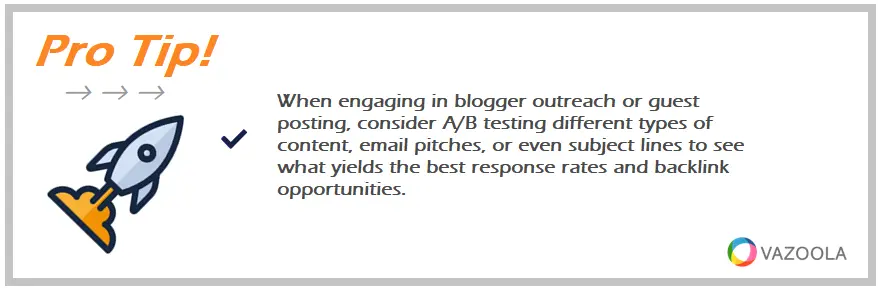
When engaging in blogger outreach or guest posting, consider A/B testing different types of content, email pitches, or even subject lines to see what yields the best response rates and backlink opportunities.
How Many Backlinks Per Month is Safe?
How many backlinks can you safely add each month? What about how many backlinks per day is safe?
There is such a thing as adding too many links or acquiring links too quickly.
When considering the pace of monthly backlink acquisition, prudence is essential. A sudden influx of backlinks can appear suspicious to search engines, potentially triggering penalties or lower rankings.
Therefore, a brand new website might need to add fewer links each day, week, or month rather than building as many links is possible from the beginning.
In contrast, an established website can add more links during the same period at the same rate as the newer site simply because it's starting with a larger backlink profile.
For example, Ahrefs studied how the rate of acquiring more links, rather than the total number of new backlinks, impacts a site's rank. It found that most of the top ranking pages obtain backlinks from new referring domains at a pace between 5% and 14.5% each month.
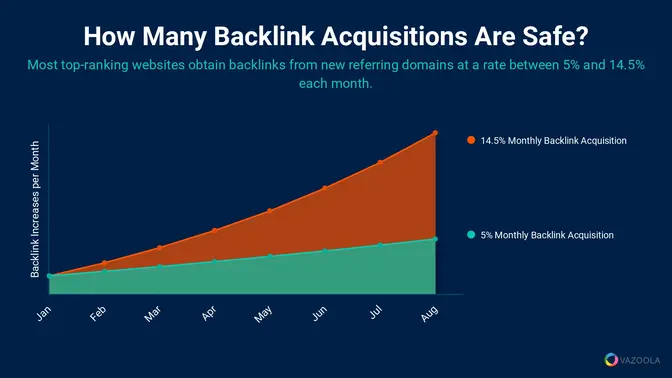
Our recommendation: A balanced, methodical strategy that mimics organic growth. The approach not only enhances your website's credibility but also aligns with search engine algorithms that favor natural link-building activities.
The impact of backlinks on your website's ranking can vary widely depending on several factors, including the competitiveness of your target keyword, the number and quality of backlinks you've acquired, and your website's on-page optimization.
Some websites experience positive ranking changes within two weeks, while others may need to wait longer. Our link building services routinely help websites with well-optimized pages tend to experience quicker, more substantial ranking improvements.
Pro Tips:
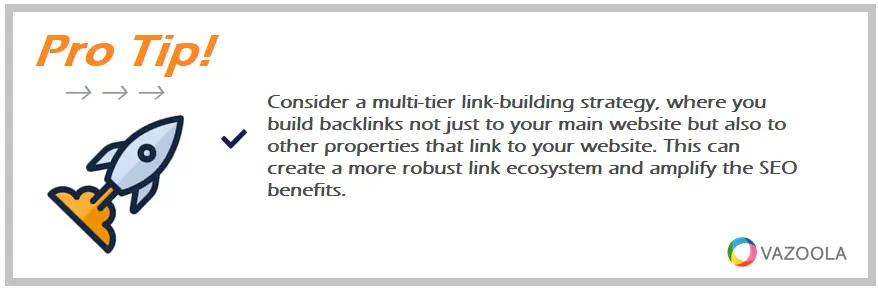
Consider a multi-tier link-building strategy, where you build backlinks not just to your main website but also to other properties that link to your website. This can create a more robust link ecosystem and amplify the SEO benefits.
Proven Strategies to Acquire Backlinks
As we explore the intricate aspects of backlink acquisition, it becomes increasingly clear that each strategy carries its own unique advantages and challenges.
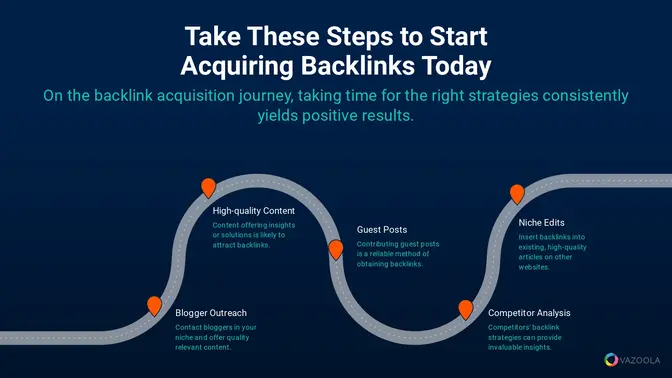
A nuanced understanding of these tactics is vital for crafting a backlink strategy that aligns seamlessly with your specific objectives and industry requirements.
Keep reading as we elaborate further on some of the most effective and proven strategies that have consistently yielded positive results for our clients at Vazoola.
Blogger Outreach
Engaging in blogger outreach is a highly effective strategy for backlink acquisition.
The approach involves reaching out to influential bloggers in your industry and offering them valuable, unique content that would resonate with their audience.
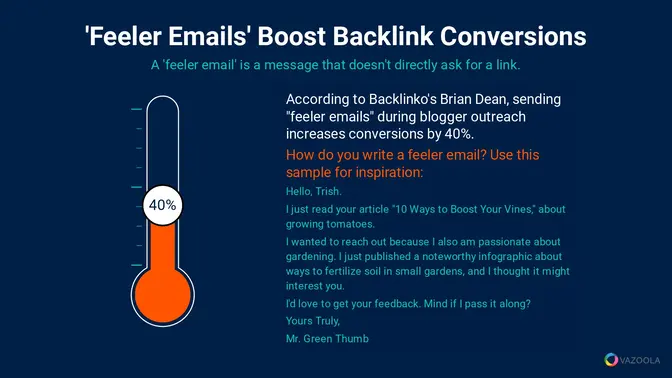
Backlinko's Brian Dean found that “Feeler” emails, messages that don't directly ask for a link, increase conversions by more than 40%.
Regardless how you initiate contact, the ultimate goal of backlink outreach is securing a backlink in exchange for your high-quality contribution.
Our recommendation: To optimize the chances of success, we suggest crafting personalized outreach messages that clearly articulate how your content can enrich their platform and benefit their readership.
High-Quality Content
Content marketing, or the time-honored adage, "Content is king," remains indisputable, particularly when the goal is to attract organic backlinks.
This principle has been a cornerstone in our client strategies at Vazoola. Exceptional, insightful, and easily shareable content tends to draw backlinks naturally.
Content that provides unique insights or solves specific problems is more likely to be shared and linked to. Such content not only provides value but also establishes your brand as an authority in the field, making others more inclined to link to your resources.
Our recommendation: Exceptional, insightful, and easily shareable content tends to draw backlinks naturally. Comprehensive guides, data-driven articles, and visually appealing infographics often attract the most backlinks.
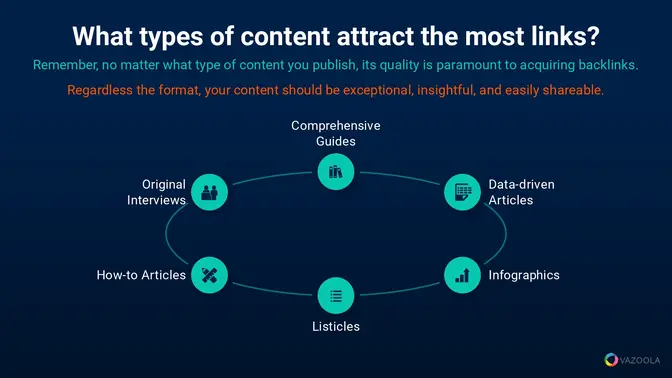
Leverage Guest Posts
Contributing guest posts to reputable blogs or websites in your industry remains an effective way to acquire quality links.
Not only does guest posting secure a valuable backlink, but it also serves as a platform to showcase your expertise and extend your brand's reach to a broader audience. This dual benefit makes guest posting a particularly compelling strategy.
Always consider the relevance and audience engagement of the specific page. A site with high user engagement can bring more traffic back to your own site, amplifying the benefits of the backlink.
We suggest crafting your guest posts to include links to other high-value content on your site, thereby encouraging deeper engagement with your brand.
The strategy not only provides you with a backlink but also exposes your brand to a wider audience.
Guest posts are an increasingly popular link building strategy, as demonstrated by a Referral Rock study referenced below:
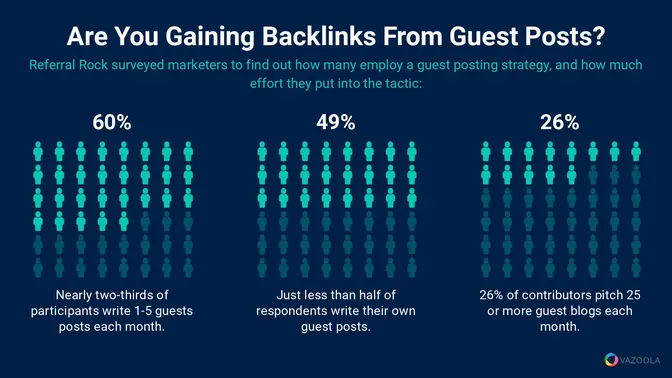
Our recommendation: For maximum impact, target websites that boast a higher Domain Authority than your own, as these backlinks will be more influential in boosting your site's ranking.
Competitor Link Building
A deep understanding of your competitors' backlink strategies can provide invaluable insights that inform your own approach. It's a strategy we frequently employ at Vazoola to give our clients an edge over other pages in even the most competitive niche.
By meticulously analyzing the backlink profiles of competitors, you can uncover gaps in your own backlinking strategy and take targeted actions to fill them.
Specialized tools like Ahrefs or our own free backlink checker enable users to pinpoint high-quality backlink opportunities that may have otherwise gone unnoticed. Beyond merely identifying gaps, such tools also assess the types of content that are attracting backlinks for competitors.
That knowledge helps tailor content strategies that are not only effective but also resonate with the target audience.
Understanding the anchor text distribution used by competitors likewise can offer clues into keyword targeting strategies, allowing for more focused and effective backlink acquisition efforts.
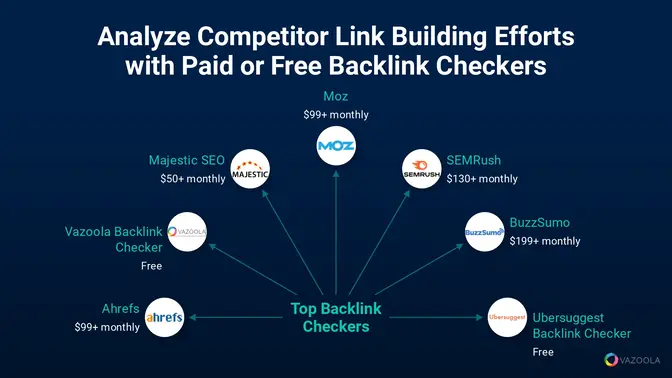
Niche Edits
Inserting backlinks into existing, high-quality articles on other websites serves as a potent strategy for enhancing your site's SEO.
Known as "niche edits," this approach capitalizes on the SEO value of content that search engines have already indexed and ranked favorably. In our experience at Vazoola, this method often provides immediate value, elevating your site's visibility more quickly than some other strategies might.
For evidence of how niche edits can impact link-building results, consider the following data from GotchSEO:
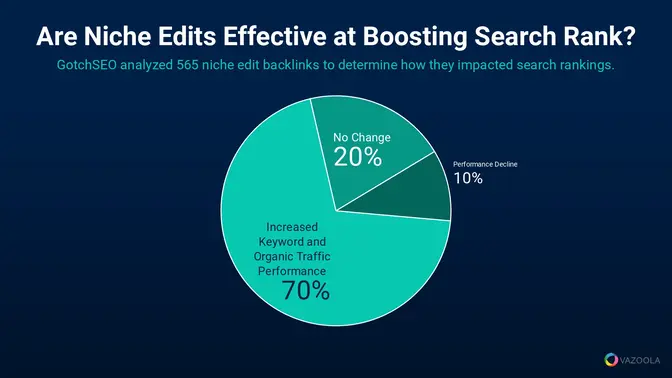
While the immediate SEO benefits of niche edits can't be denied, exercising caution remains imperative.
When you build backlinks, the content into which you insert your backlink should align closely with your website's focus and must offer genuine value to the reader. Such synchrony ensures that the backlink appears natural and minimizes the risk of search engine penalties for manipulative practices.
When contacting external website owners to suggest a niche edit, send a pitch that not only explains who you are, and which link or content you'd like to add to their site, and how the niche edit will benefit you both.
Our recommendation: Consider also the Domain Authority of the site where you're inserting your backlink; a higher Domain Authority generally makes the backlink more impactful.
Recap: How Many Backlinks Should a Website Have to Rank?
How many backlinks do you need to rank with Google?
When building backlinks, addressing the question of how many backlinks are needed for effective ranking involves a multi-faceted approach.
While the sheer number of backlinks is important, the quality of those backlinks often carries more weight.
Services like Vazoola can provide expert guidance in determining your backlink needs and securing high-quality backlinks that can significantly impact your rankings.
Likewise, a diversified backlink profile is essential for long-term SEO success.
“The reality of SEO is the reality of any successful endeavor," said Flow SEO founder Viola Eva. "It will take strategic, consistent, and sufficient efforts to rank well.”
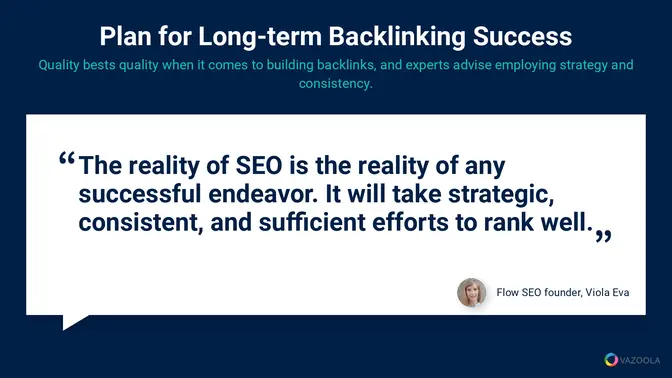
Acquiring a diverse backlink profile requires acquiring backlinks from a variety of authoritative sources, including industry blogs, news outlets, and academic journals. This diversification not only boosts your website's overall authority but also provides a safety net against algorithmic changes.
By following these proven strategies and insights, you'll be better equipped to answer the pivotal question: "How many backlinks are required to rank?"
Pro Tips:
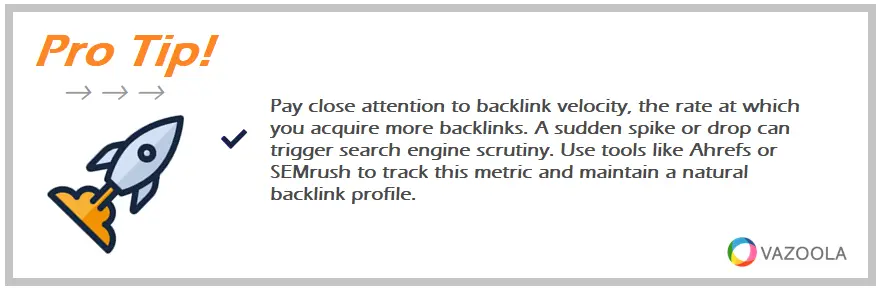
Pay close attention to backlink velocity, the rate at which you acquire more backlinks. A sudden spike or drop can trigger search engine scrutiny. Use tools like Ahrefs or SEMrush to track this metric and maintain a natural backlink profile.

